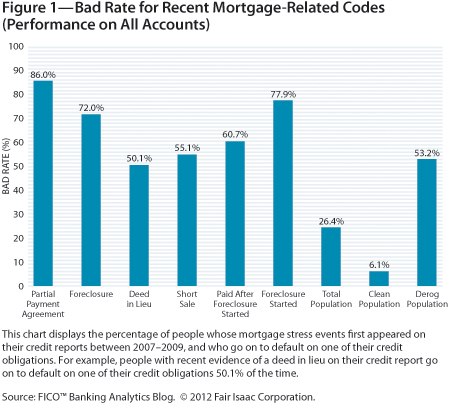(http://www.fico.com/en/blogs/) My colleague Joanne Gaskin wrote a great post about the impact to the FICO® Score from short sales and other mortgage stress-related events. One of the questions we get asked most often is whether it remains appropriate for the scoring model to treat a short sale in a manner similar to a foreclosure. Critics assert that since short sales do not cost the bank as much money as foreclosures, the penalty to a credit score should be less, commensurate with the financial impact on a lender. Some also suggest that the borrower’s willingness to work with the lender should have a positive effect on his/her credit risk.
Another argument for revisiting the scoring model’s treatment of these mortgage stress events is that the mortgage crisis was unprecedented. Consumers, who would have otherwise paid responsibly, were now making decisions that theoretically were not representative of their true risk.
To test these arguments, we conducted a study isolating more recent occurrences of mortgage stress events. By studying the subsequent performance of these borrowers on all accounts, we determined the credit risk associated with their mortgage events. Looking at data from October 2009 to October 2011, we were able to verify that short sales and other events of recent mortgage distress continue to represent a high degree of risk. These results closely match earlier studies of the risk associated with short sales and other events of mortgage stress.
As the graph below shows, short sales remain extremely risky. However, foreclosures have a bad rate of 72.0% while short sales have a better bad rate of 55.1%. Should that lead to less punitive treatment for short sales?




